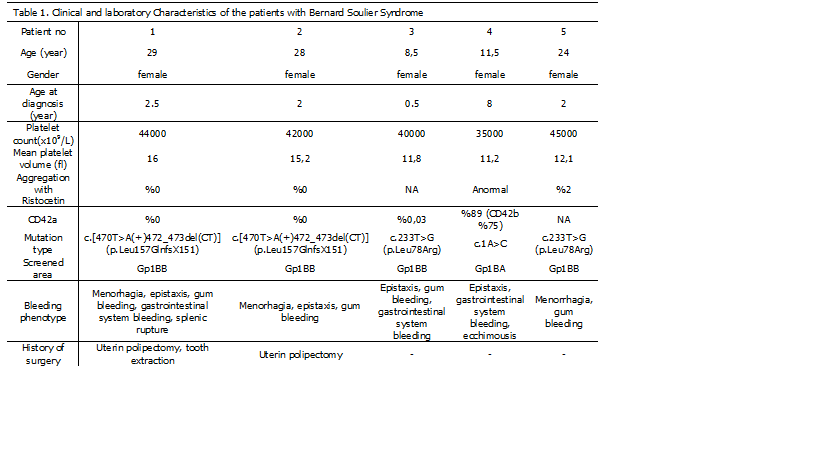Pediatric Hematology and Oncology

Contributions
Type: Publication Only
Background
Bernard Soulier Syndrome (BSS) is a rare inherited disorder of platelet function due to absence of obviously decreased expression of the platelet Gp Ib-V-IX receptor. This complex plays a critical role in hemostasis by initiating platelet adhesion and subsequent activation at the site of injured vessel. Due to rarity of disease, there are reports only a few cases about the relationship between phenotype and genotype.
Aims
We aimed to evaluate clinical and genetic characteristics of the patients with BSS diagnosed at our department.
Methods
Five patients with BSS diagnosed at department of Pediatric Hematology, Necmettin Erbakan University, Meram Medical Faculty, were enrolled the study. The diagnosis of patients was based on low platelet count, presence of giant platelets and aggregometric studies. Flow cytometry to assess the surface Gp Ib-V-IX complex showed reduced expression. Clinical manifestations and laboratory investigations of the patients were evaluated. We also analyzed the coding regions of genes GpIBA (NM-ooo173,4), GpIBB (NM-000407.4_ and GpIX (NM-000174.3) using DNA samples of affected patients and their family members.
Results
Four of the patients have mutation in GpIBB gene. Two patients have c.233T>G (p.Leu78Arg) in GpIBB gene. Two patients have c.[470T>A(+)472_473del(CT)] (p.Leu157GlnfsX151) in GpIBB gene. One patient has c.1A>C in GpIA gene. Clinical and laboratory findings of the patients are summarized in table 1.
Summary
Patients with BSS often suffer from mucocutaneous bleedings. All of our cases are female. Menorrhagia is the major problem for girls at the age of menstruation. One patient, who carrying the mutation of c.[470T>A(+)472_473del(CT)] (p.Leu157GlnfsX151) at GpIBB gene, had experienced spontaneous splenic rupture and successfully treated with conservative approaches such as transfusion of erythrocyte and thrombocyte suspensions. Three different mutations were identified in 5 patients. All of them are previously described mutations. Larger collaborative studies are needed to describe relationship between clinical phenotype and genotype.
Keyword(s): Bernard-Soulier syndrome, Mutation analysis

Session topic: Publication Only
Type: Publication Only
Background
Bernard Soulier Syndrome (BSS) is a rare inherited disorder of platelet function due to absence of obviously decreased expression of the platelet Gp Ib-V-IX receptor. This complex plays a critical role in hemostasis by initiating platelet adhesion and subsequent activation at the site of injured vessel. Due to rarity of disease, there are reports only a few cases about the relationship between phenotype and genotype.
Aims
We aimed to evaluate clinical and genetic characteristics of the patients with BSS diagnosed at our department.
Methods
Five patients with BSS diagnosed at department of Pediatric Hematology, Necmettin Erbakan University, Meram Medical Faculty, were enrolled the study. The diagnosis of patients was based on low platelet count, presence of giant platelets and aggregometric studies. Flow cytometry to assess the surface Gp Ib-V-IX complex showed reduced expression. Clinical manifestations and laboratory investigations of the patients were evaluated. We also analyzed the coding regions of genes GpIBA (NM-ooo173,4), GpIBB (NM-000407.4_ and GpIX (NM-000174.3) using DNA samples of affected patients and their family members.
Results
Four of the patients have mutation in GpIBB gene. Two patients have c.233T>G (p.Leu78Arg) in GpIBB gene. Two patients have c.[470T>A(+)472_473del(CT)] (p.Leu157GlnfsX151) in GpIBB gene. One patient has c.1A>C in GpIA gene. Clinical and laboratory findings of the patients are summarized in table 1.
Summary
Patients with BSS often suffer from mucocutaneous bleedings. All of our cases are female. Menorrhagia is the major problem for girls at the age of menstruation. One patient, who carrying the mutation of c.[470T>A(+)472_473del(CT)] (p.Leu157GlnfsX151) at GpIBB gene, had experienced spontaneous splenic rupture and successfully treated with conservative approaches such as transfusion of erythrocyte and thrombocyte suspensions. Three different mutations were identified in 5 patients. All of them are previously described mutations. Larger collaborative studies are needed to describe relationship between clinical phenotype and genotype.
Keyword(s): Bernard-Soulier syndrome, Mutation analysis

Session topic: Publication Only


